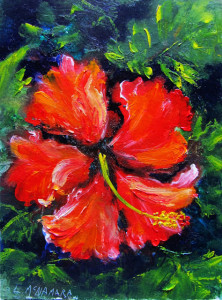Virginia Pye: What possessed you to write “Be Still, My Growling Stomach,” a fantasy that builds on ancient mythical tales?
Wendi Berry: I didn’t set out to write fantasy. I was in my fourth semester in Queens University low res MFA program, working on a novel and stories, and I kept getting feedback that my male characters all seemed “pitiful.” My peers were asking, why so pitiful and why do the female protagonists see them that way? I was asking myself that question, when this story leapt out. In Steve Rinehart’s workshop, they said it was allegorical.
VP: What were you reading when you got the idea for this story?
WB: I was reading Jim Shepard’s short story collection, Love and Hydrogen, including “The Creature from the Black Lagoon,” and wanted to try my hand at inhabiting a monster. A monster, I guess, who found men trifling. Out came this dragon. The most fun I had was creating the dragon’s lair and describing the flowers and plants. I needed a name for a dragon and when I read online that Jormungand was a great beast in Norse mythology, I thought that’ll work, and shortened it to Jormu.
VP: Your story starts with a great opening line: I ate a man for breakfast. When you wrote that did you know how the story would unfold?
WB: I knew I wanted a strong voice. Looking back, it felt as if I were channeling Mae West. She’s quoted online as saying: “All discarded lovers should be given a second chance, but with somebody else.” Through an encounter with Rodney (sympathetic because he had just lost his wife and was grieving), there was an opportunity to view how Jormu saw this one. Did she hold Rodney in contempt? Could she give him his second chance? Writing several drafts, I discovered that not only Jormu, but her mother, too, had been used and abandoned by men, so the disappointment had been handed down and was deep.
VP: I gather you have a novel you’ve completed and hope to sell soon. Can you tell us about it? I’m curious to know if it relates to this story–even thematically?
WB: The Apple in the Jar concerns a reclusive woman named Leash (née Lisa) hiding away in Chapel Hill for 17 years and pondering what the local shaman meant when he said “to put the apple in the jar,” when she asked about relationships. Leash gets called back to Richmond, Virginia for a funeral and is thrust back into friendships she thought were long since over. Thematically, the dragon story relates in the sense that she’s disappointed in her relationships with men, but unlike Jormu, Leash emerges from her cave and breaks free of some old expectations.
VP: What are you working on now and what are you reading?
WB: A collection of stories on the dignity of loneliness. This includes couples who are lonely. The title story is “Eating Lunch in Cars.”
Recently, I finished reading Rick Bragg’s memoir, All Over but the Shoutin.’ I really admire his use of concrete detail (such as the mother’s flip flops and cut off dungarees), to tell such a heart-rending story of family poverty. This past week, I finished Pamela Erens’ debut novel The Understory and was enthralled by the first person narration of being evicted in New York. Two years ago, I had the great fortune to attend Sewanee Writers’ Conference, and I enjoy supporting the writers I met there. Pamela was one of them. Another novel that I can’t stop thinking about is Mona Simpson’s Anywhere but Here because of the mother/daughter relationship and the tenuous sense of home and place.
VP: You received your MFA from Queens University. Was that a good experience for you, and do you recommend long distance writing programs?
WB: Through the years, I had applied to full residency programs, and it wasn’t happening. The clock was ticking, and I knew there were gaps and things I wasn’t getting. I was publishing, but wanted to take my writing to the next level. Queens’ critiquing process helped me see more clearly the mechanics of storytelling and voice and how to flesh out characters. Seeing how other stories got built gave me patience with my own process. I read a lot of good books and met other writers during the residencies. Since graduating, the support has been tremendous. Queens offers not one but two alumni programs, so I continue to meet writers, and there’s a chance to promote my work. A bonus was I got to study with Elizabeth Strout who assigned me to re-write chapters from multiple viewpoints. I’ll never forget, during a spring residency, many of my peers were out trying the local cafes–I was in my dorm room discovering what was driving my most trying character. It was awesome!
Virginia Pye’s second novel, DREAMS OF THE RED PHOENIX, was called “Riveting,” by Library Journal and “Superb historical fiction!” by the Historical Fiction Review. Her first novel, RIVER OF DUST, was an Indie Next Pick and a 2014 Finalist of the Library of Virginia Award in Fiction. Her award-winning short stories have appeared in numerous literary magazines and her essays can be found in The New York Times Opinionator, Literary Hub, The Rumpus, Huffington Post and elsewhere. Please visit her at: www.virginiapye.com



Pingback: “Be Still, My Growling Stomach” by Wendi Berry | Rkvry Quarterly Literary Journal